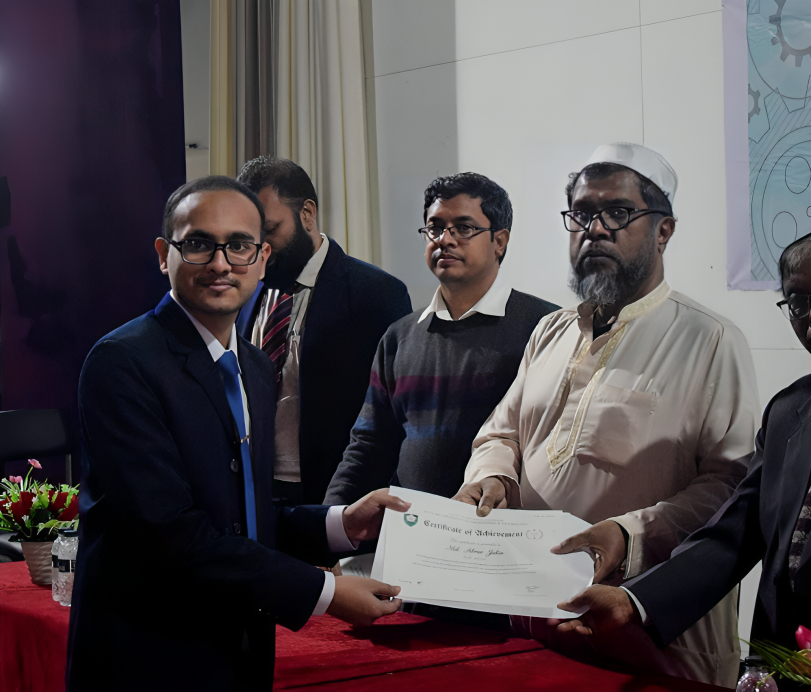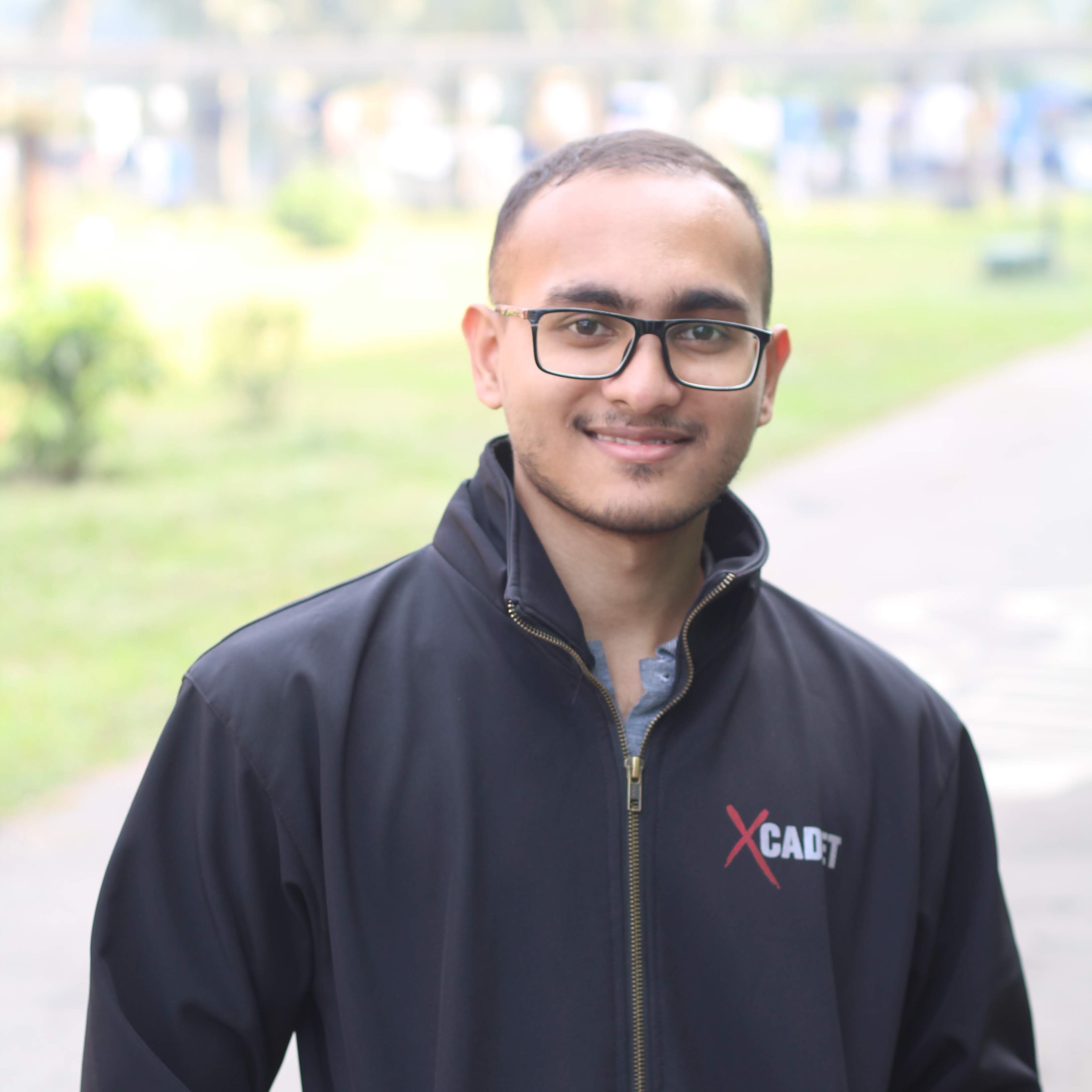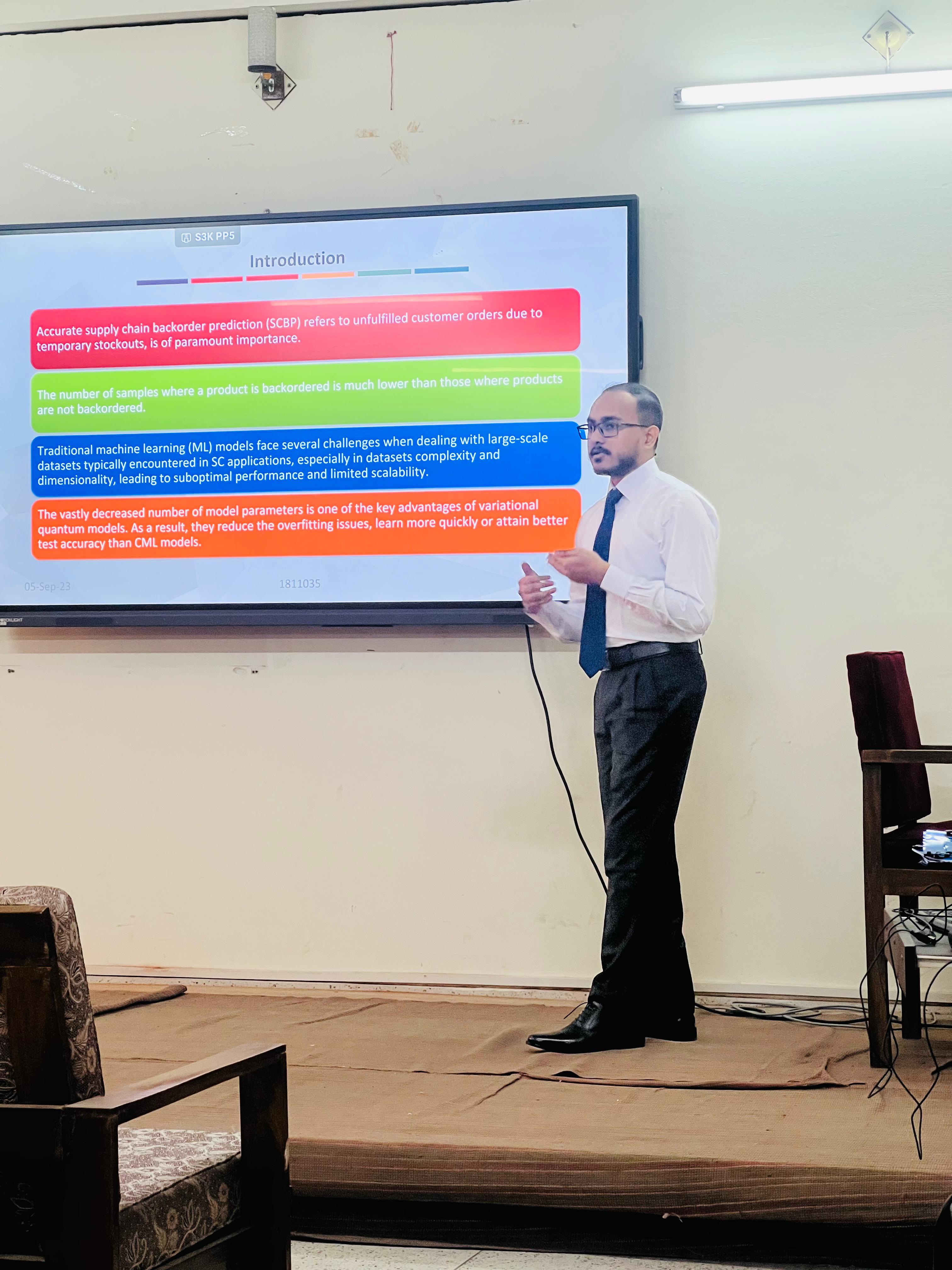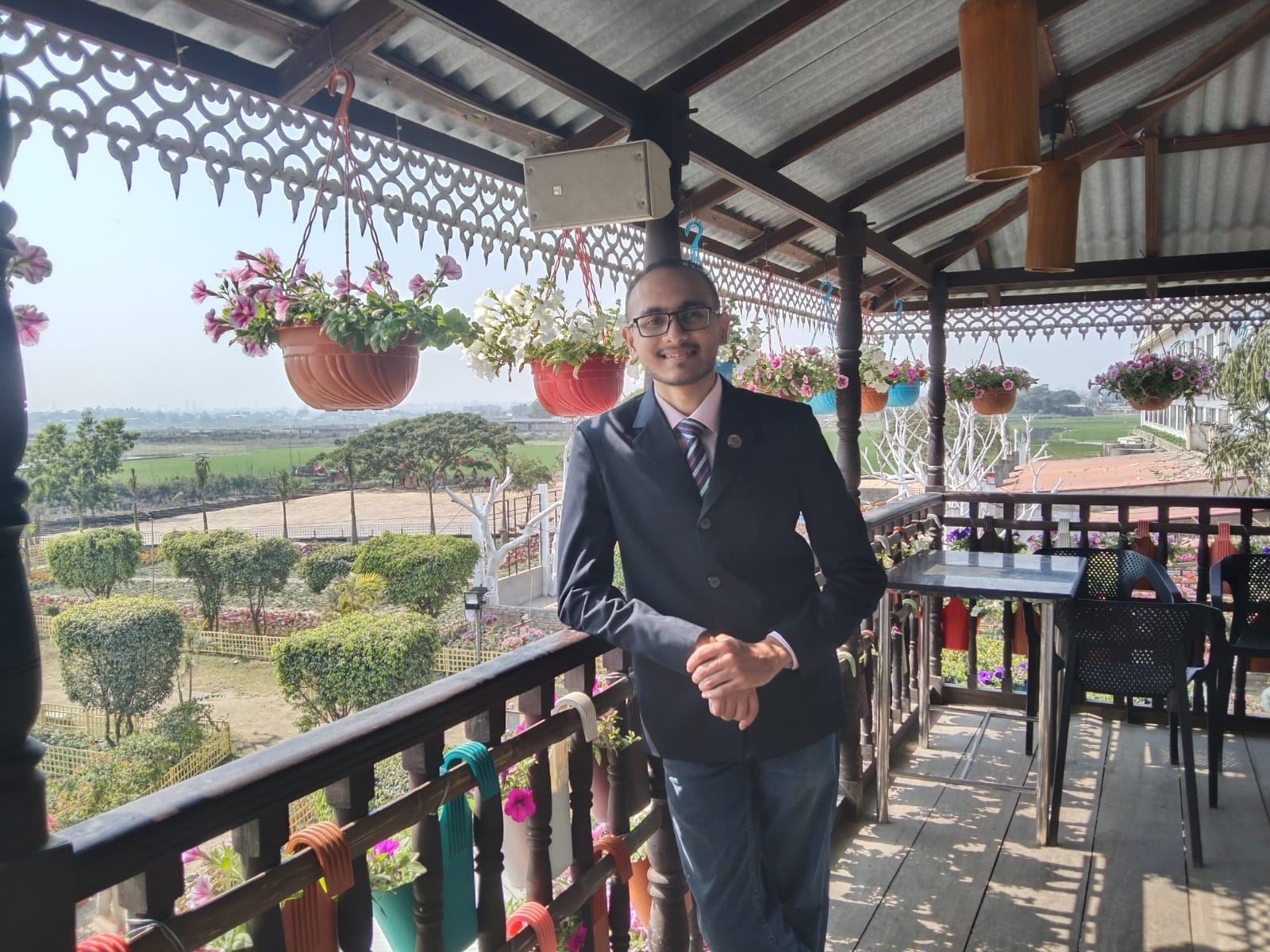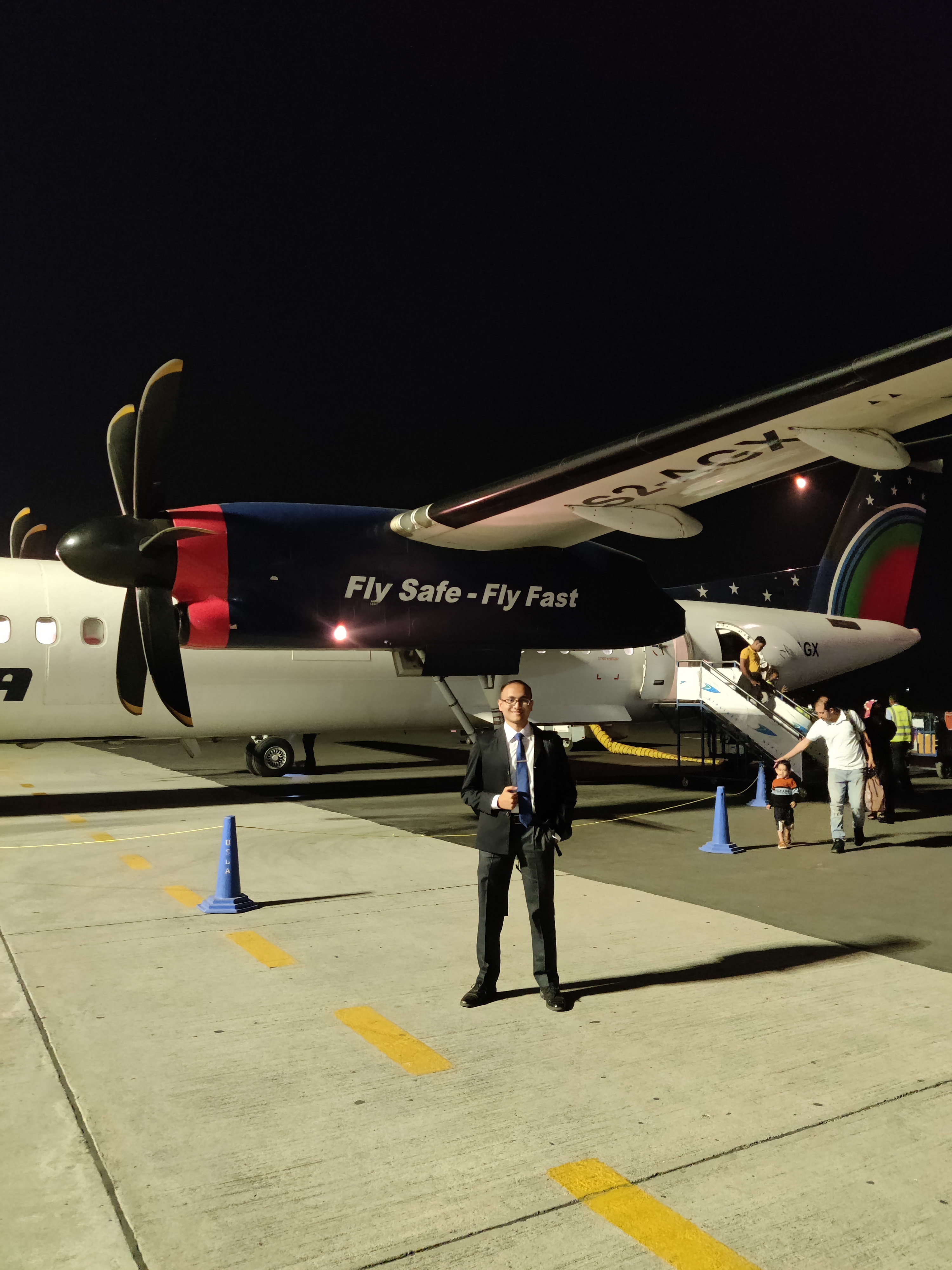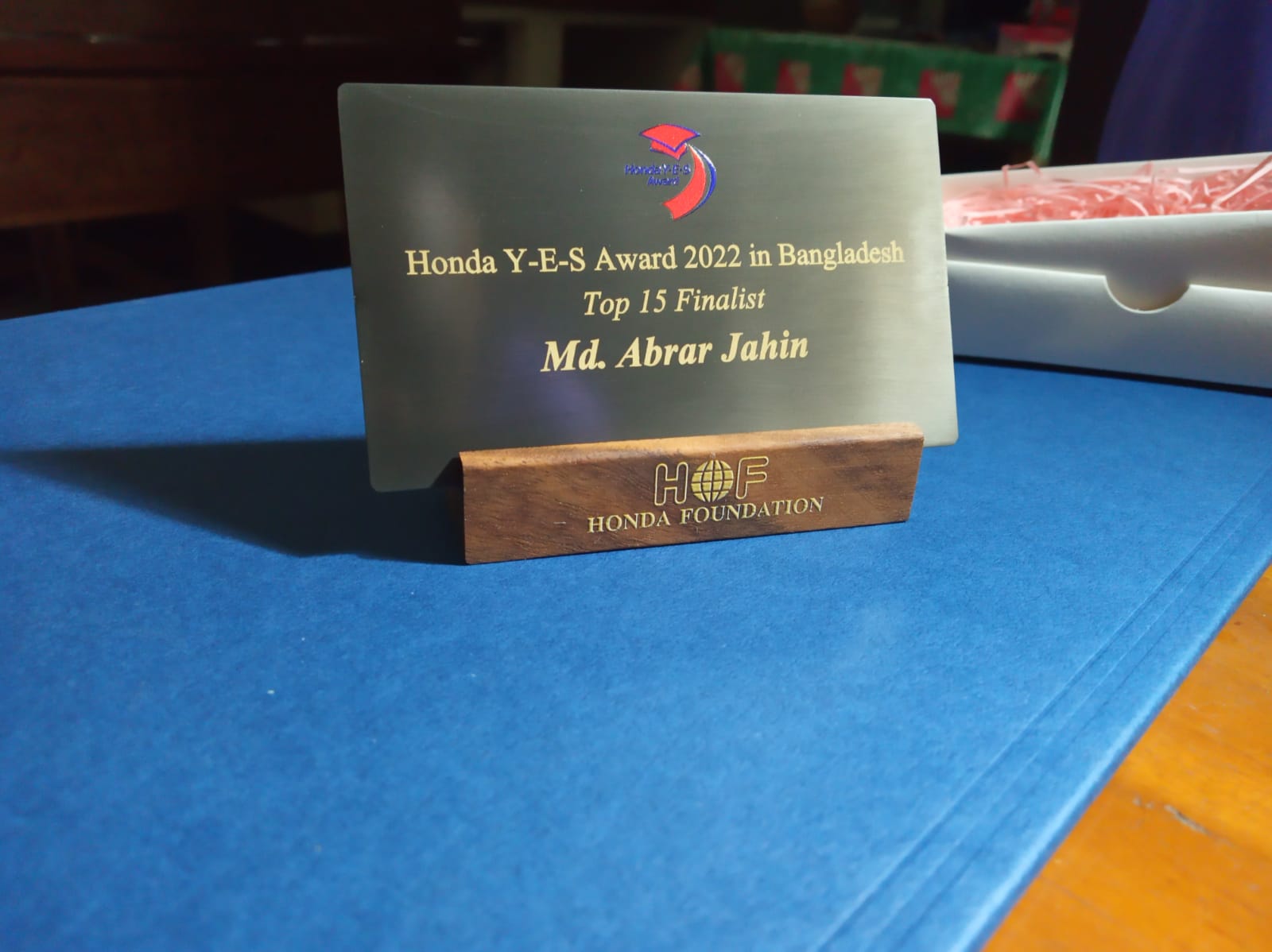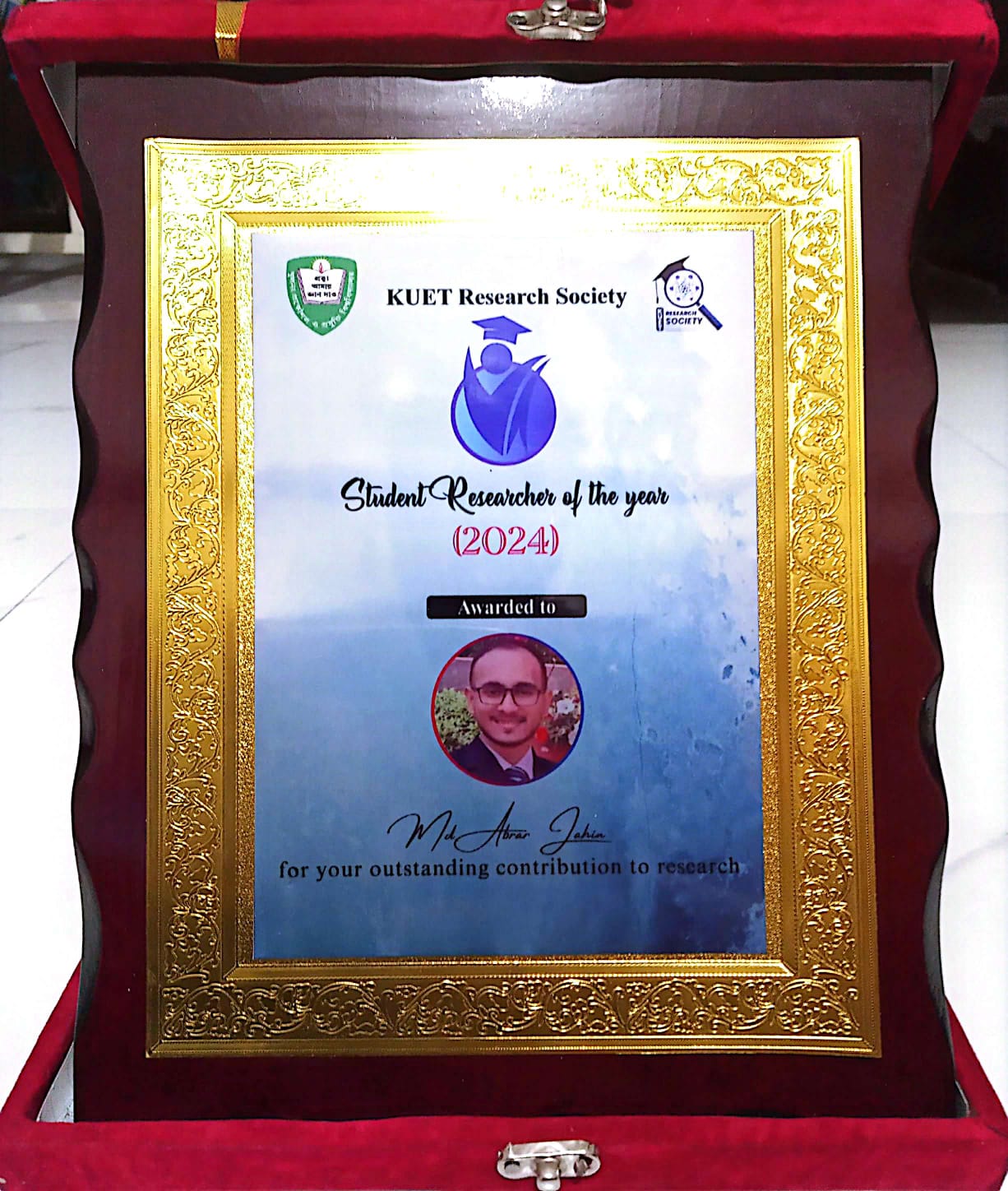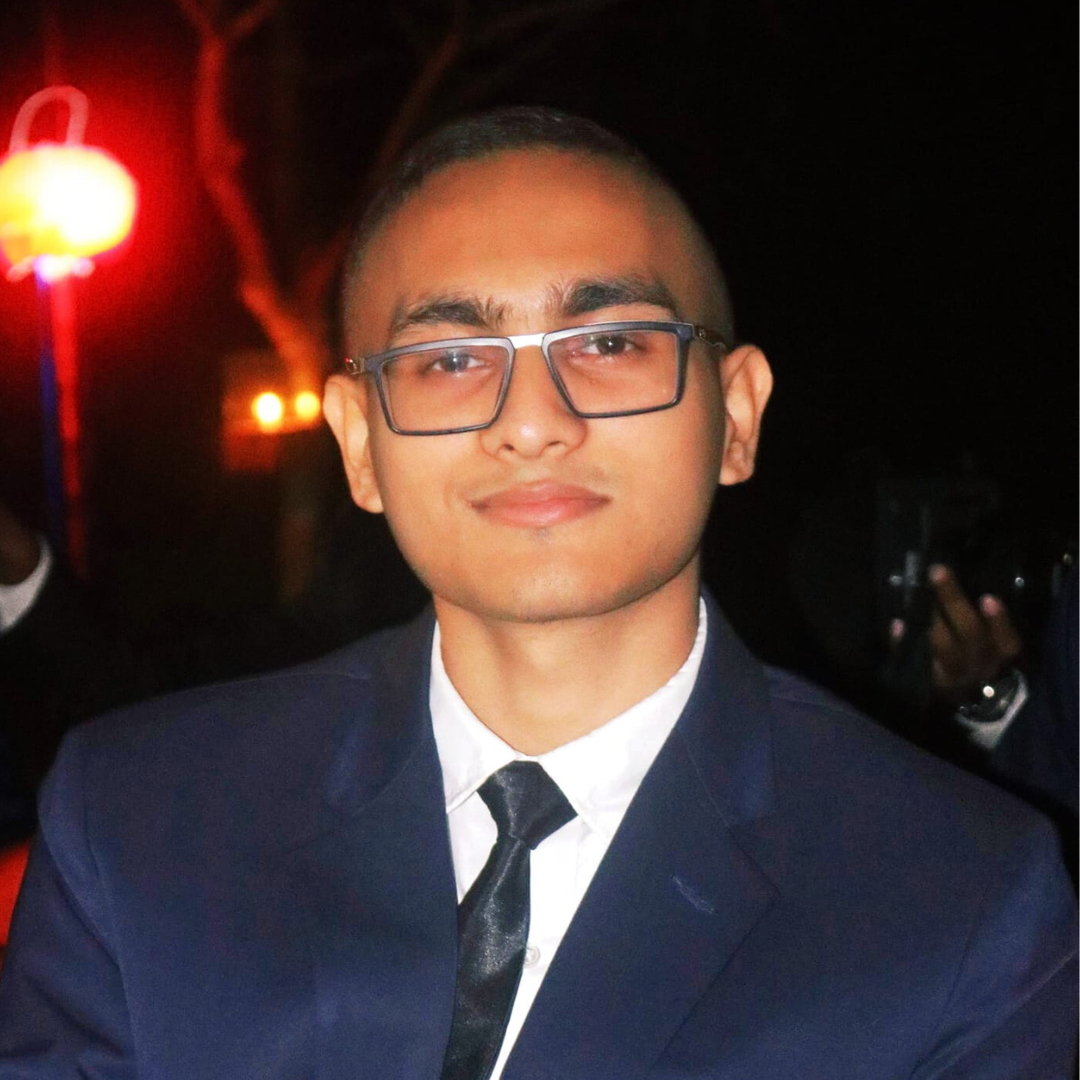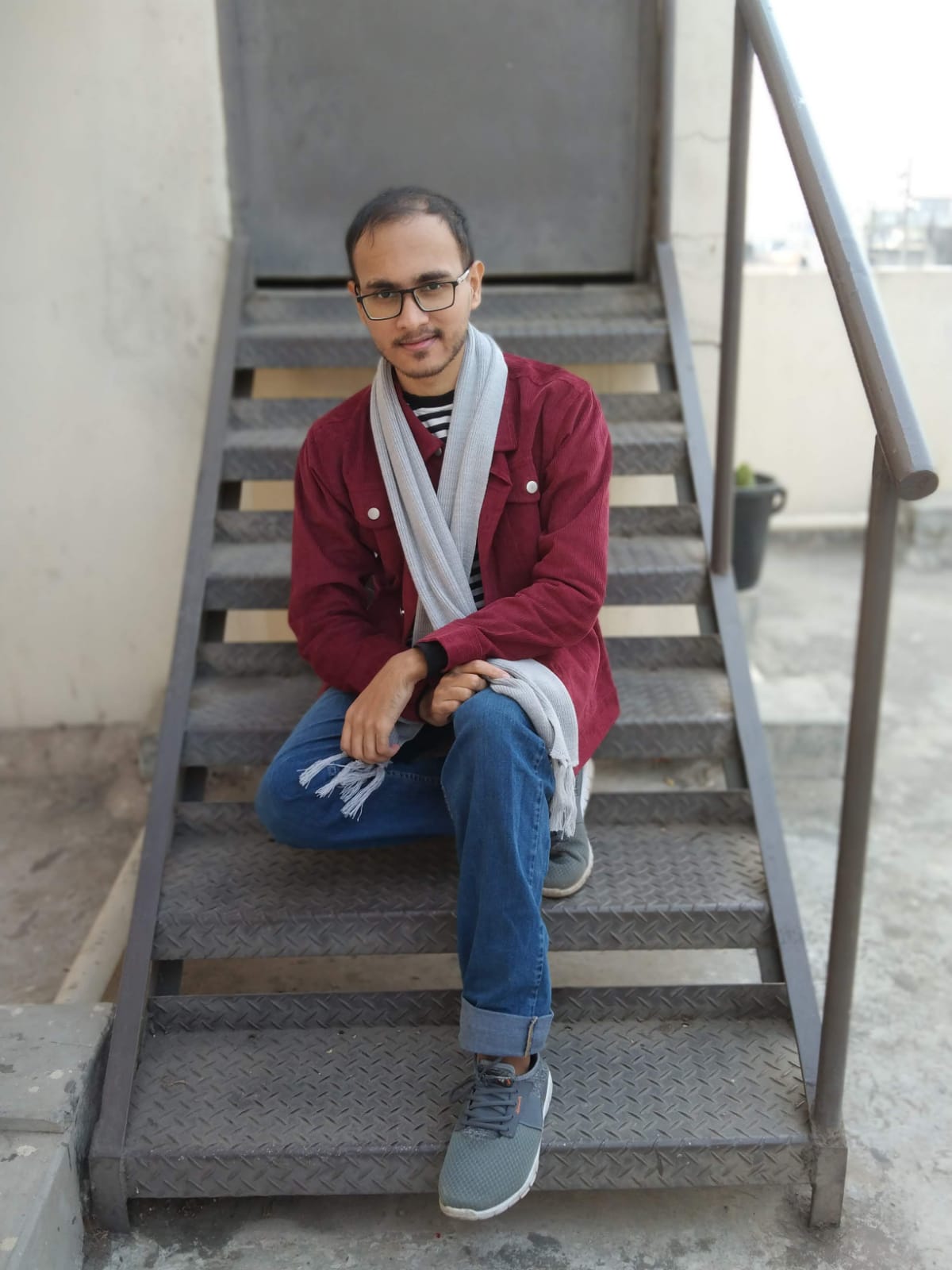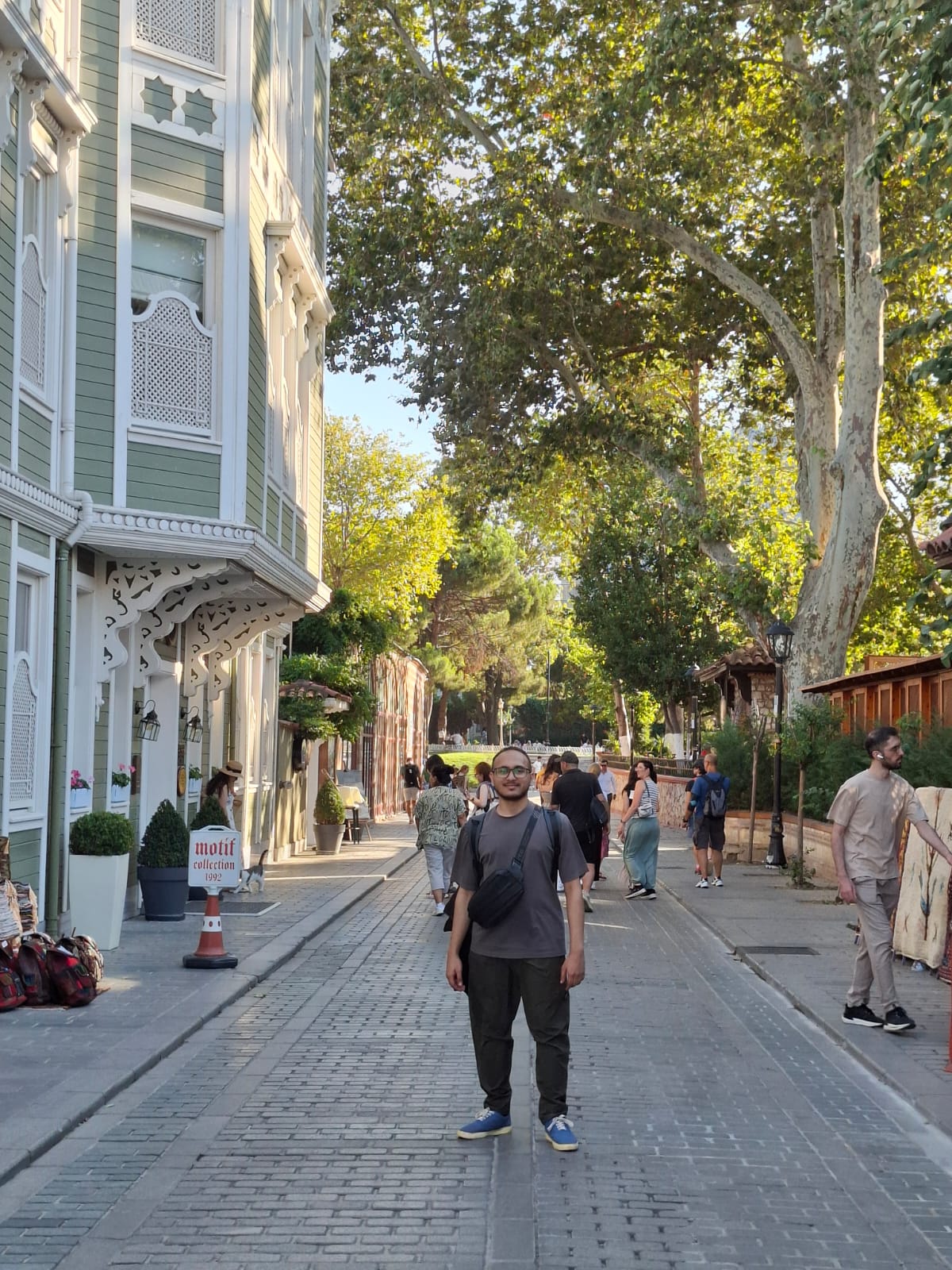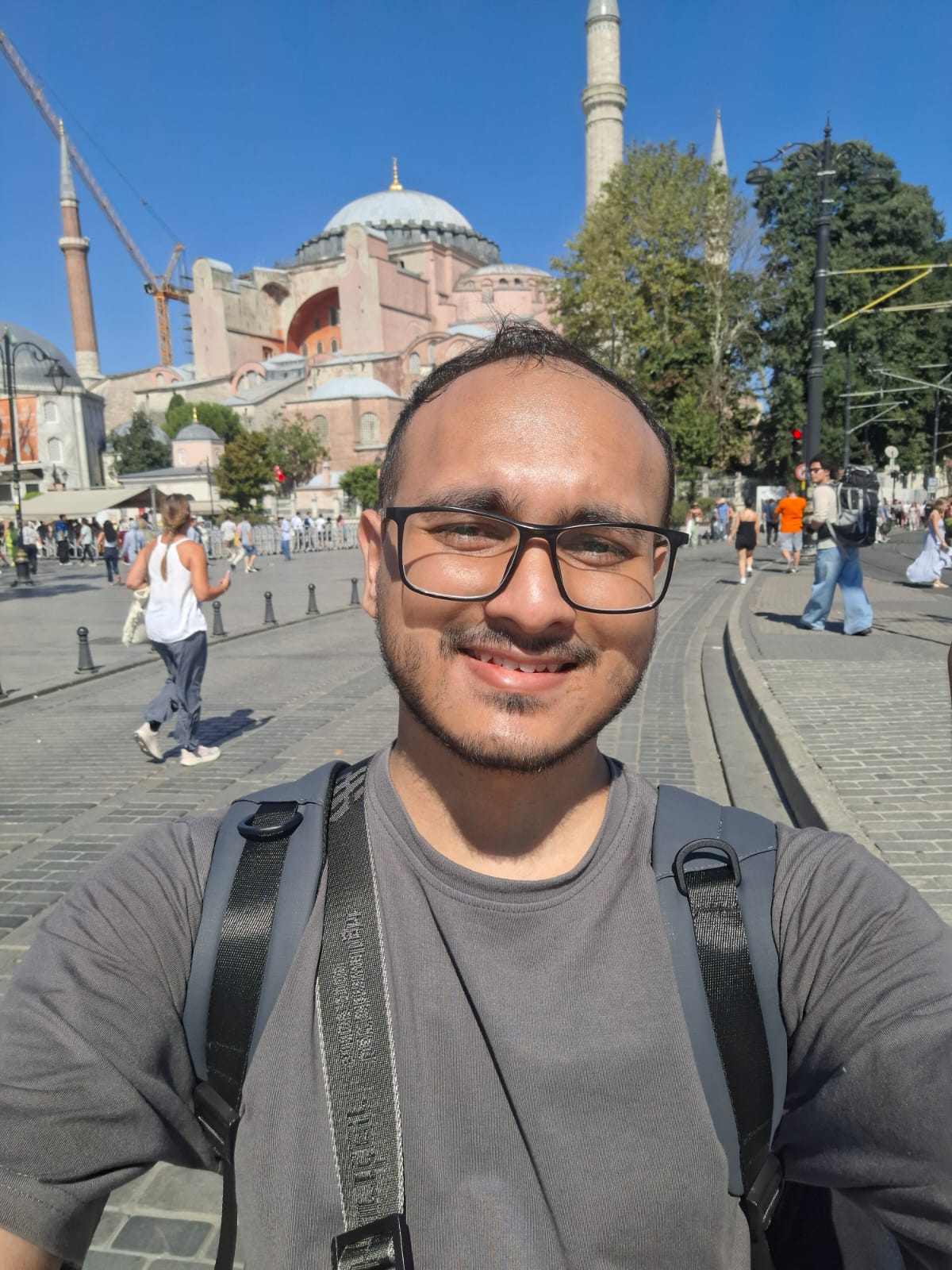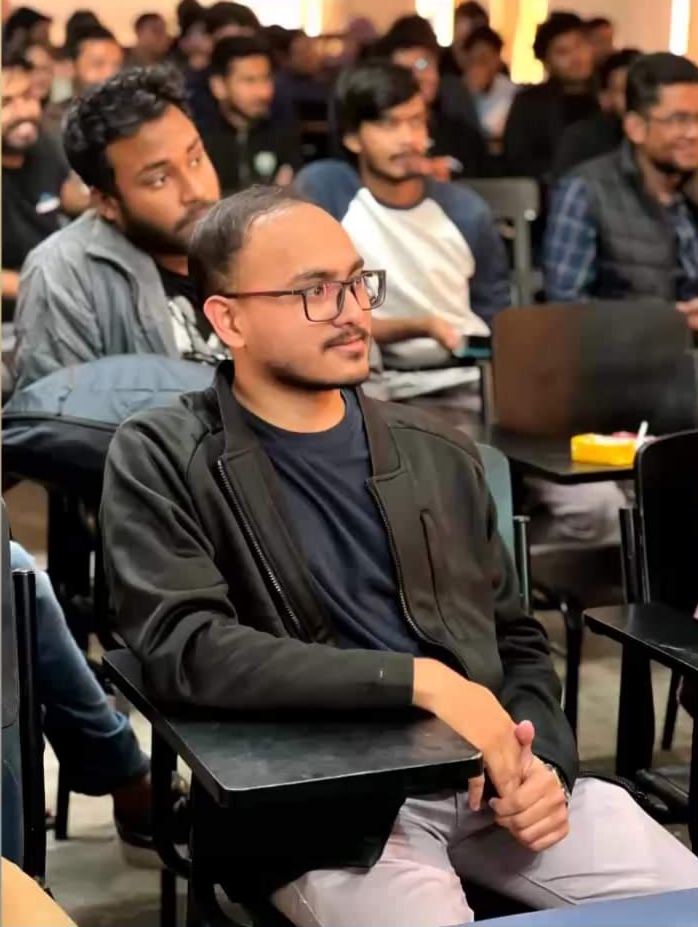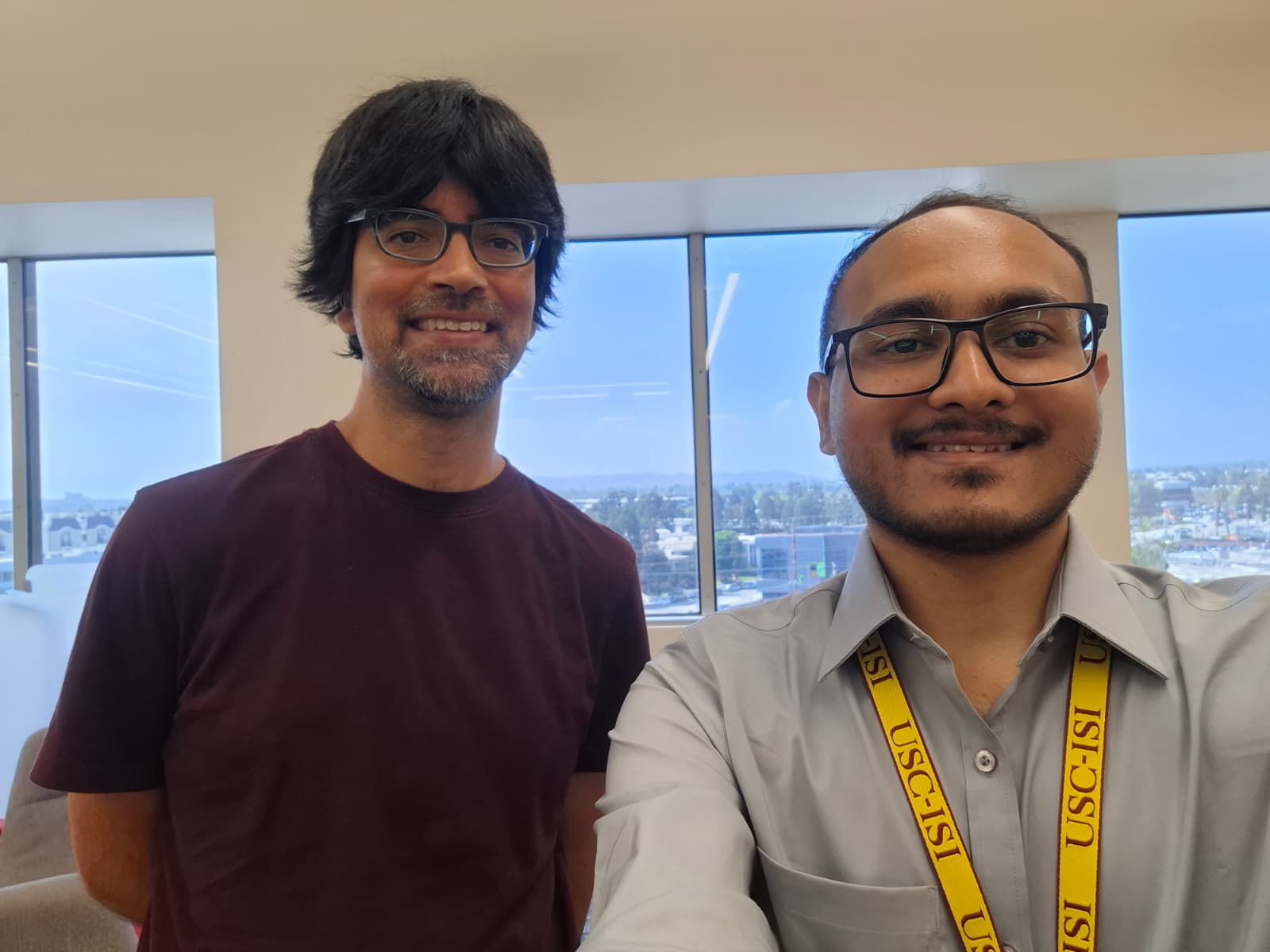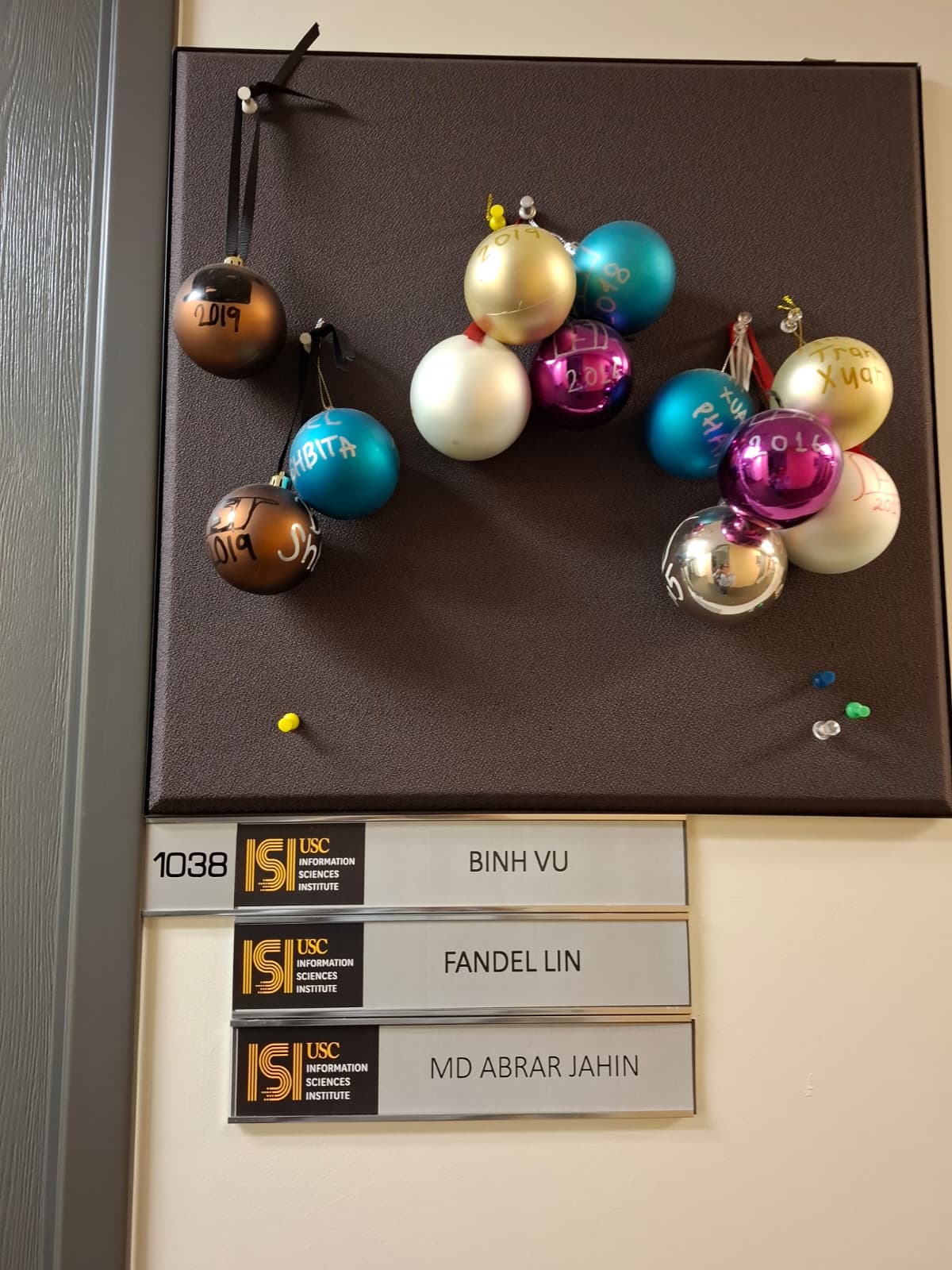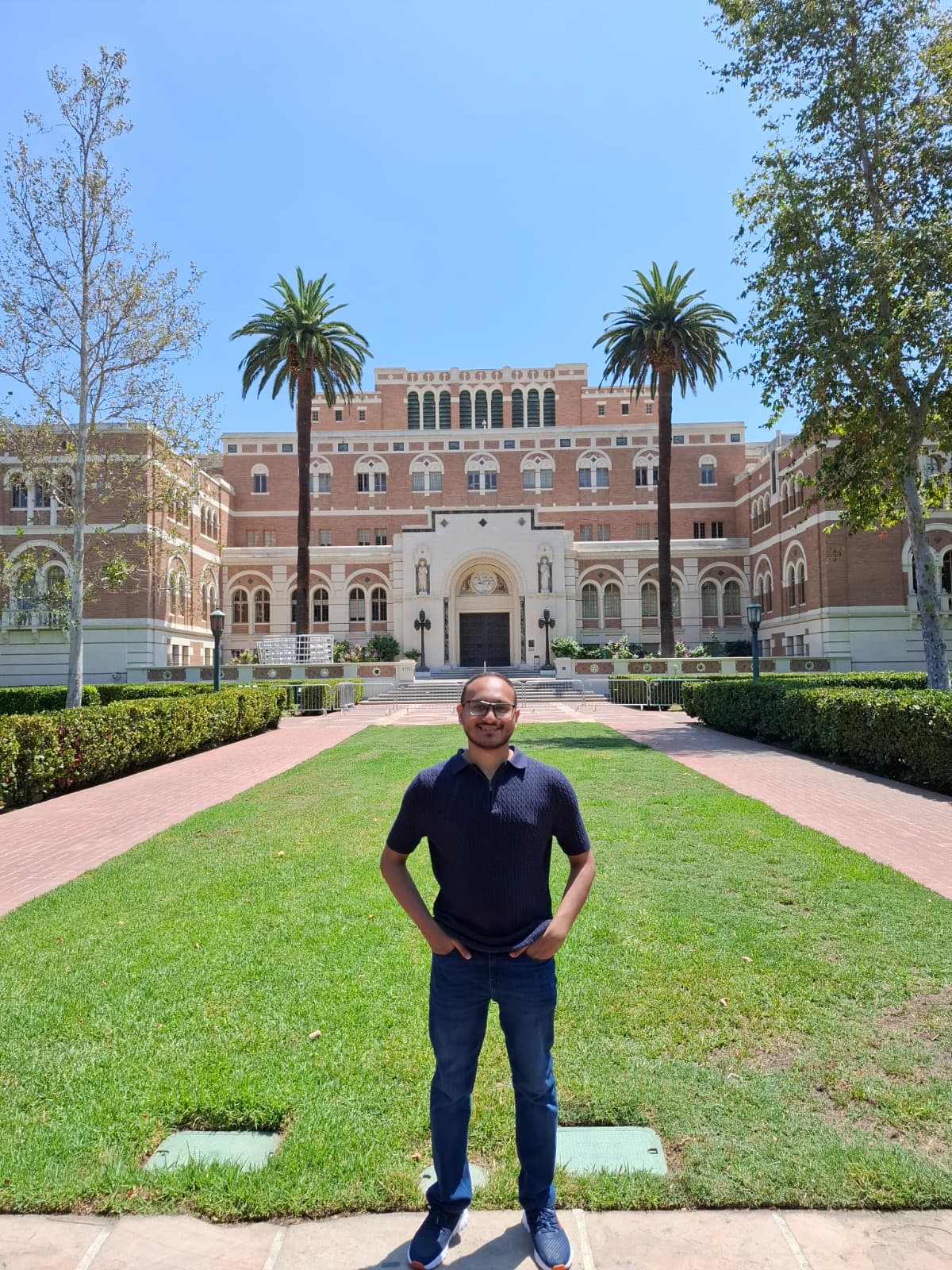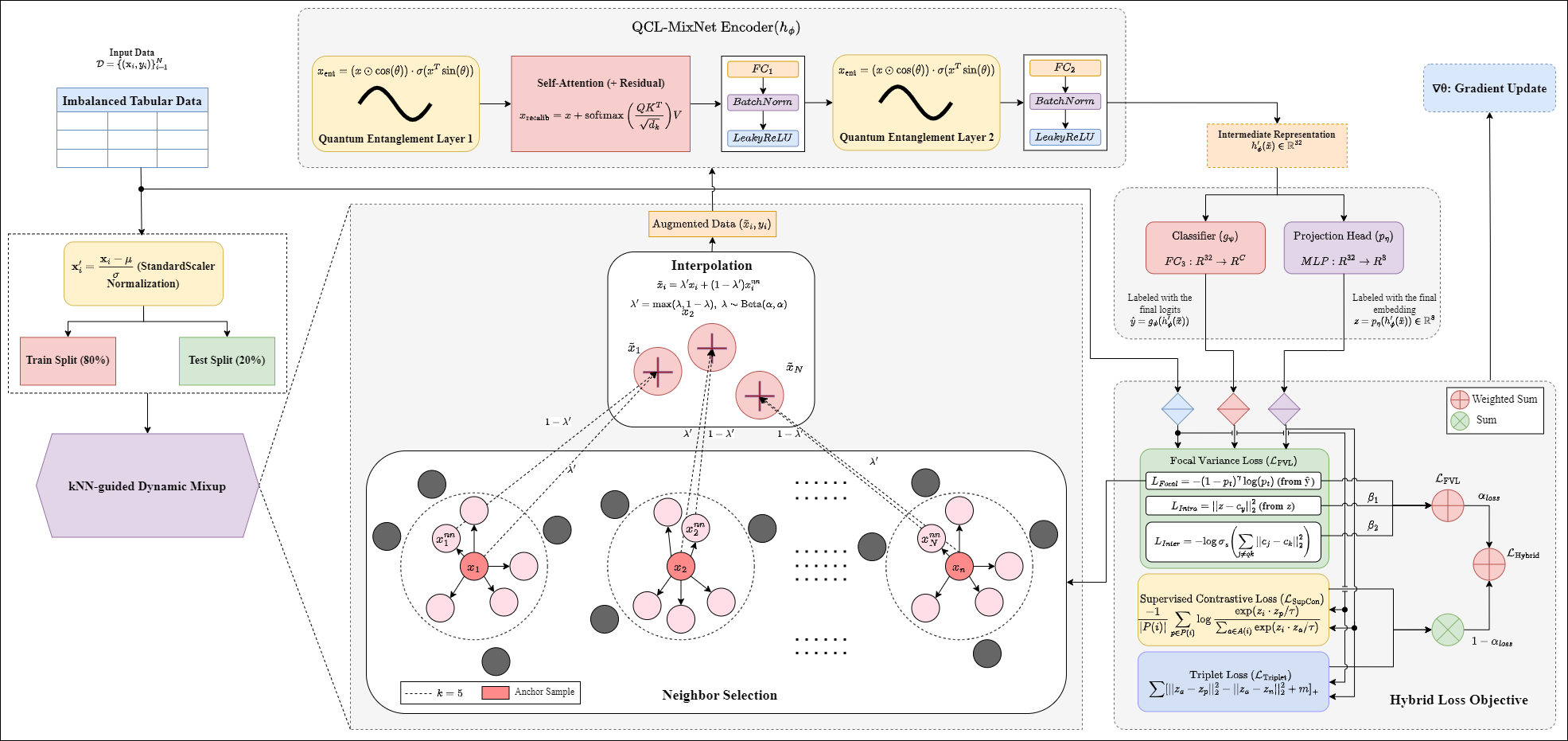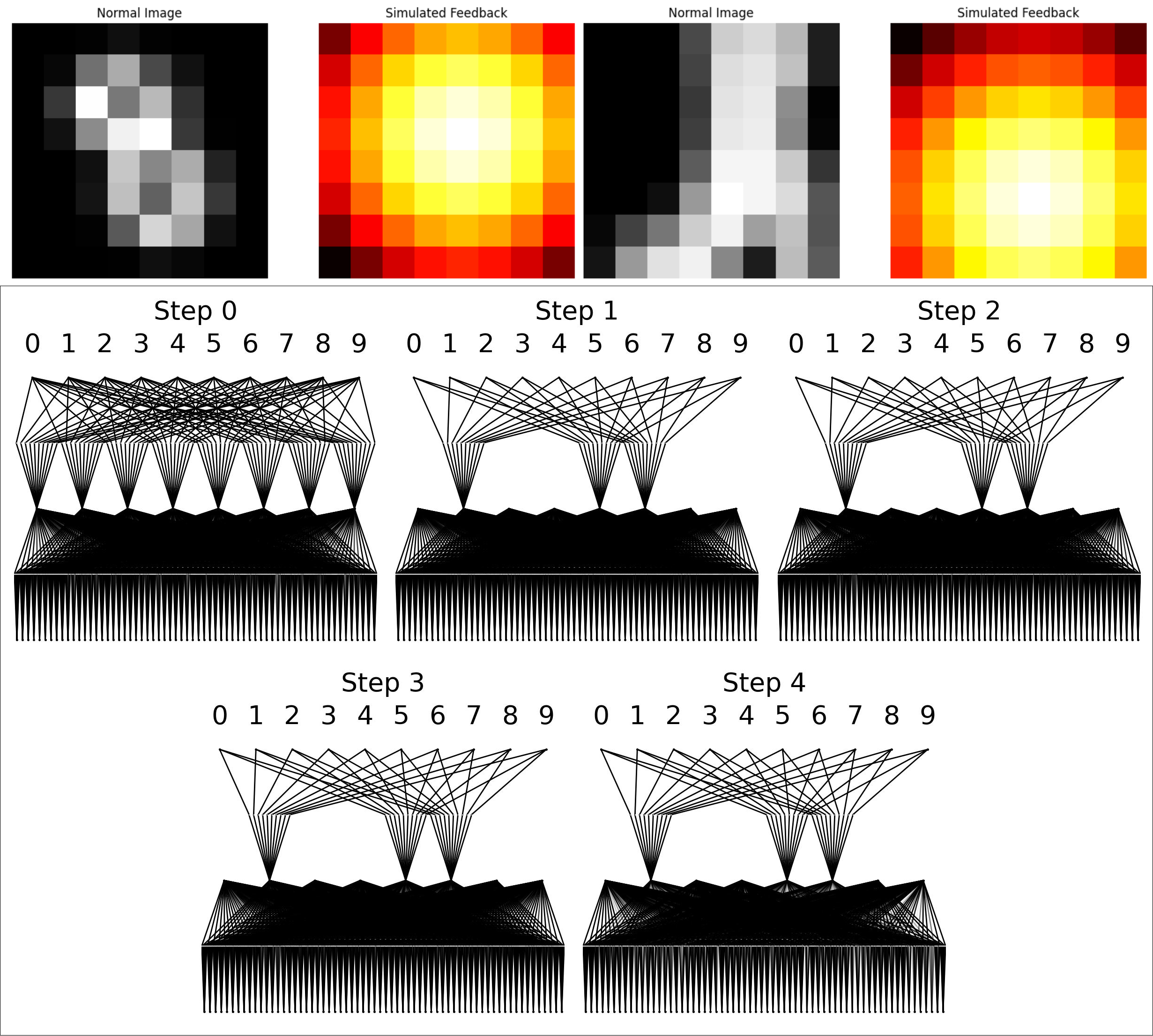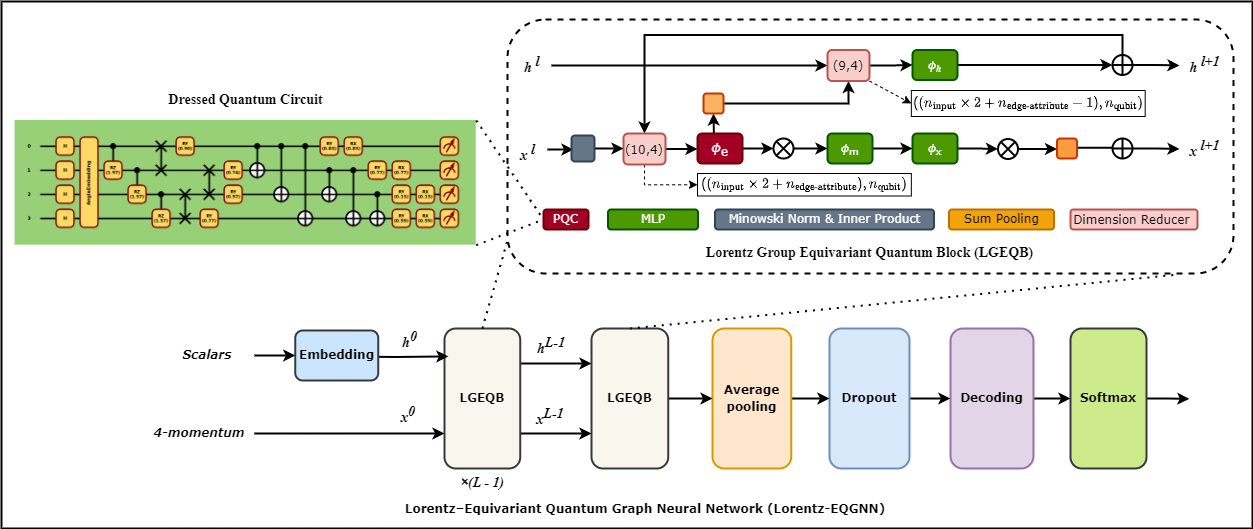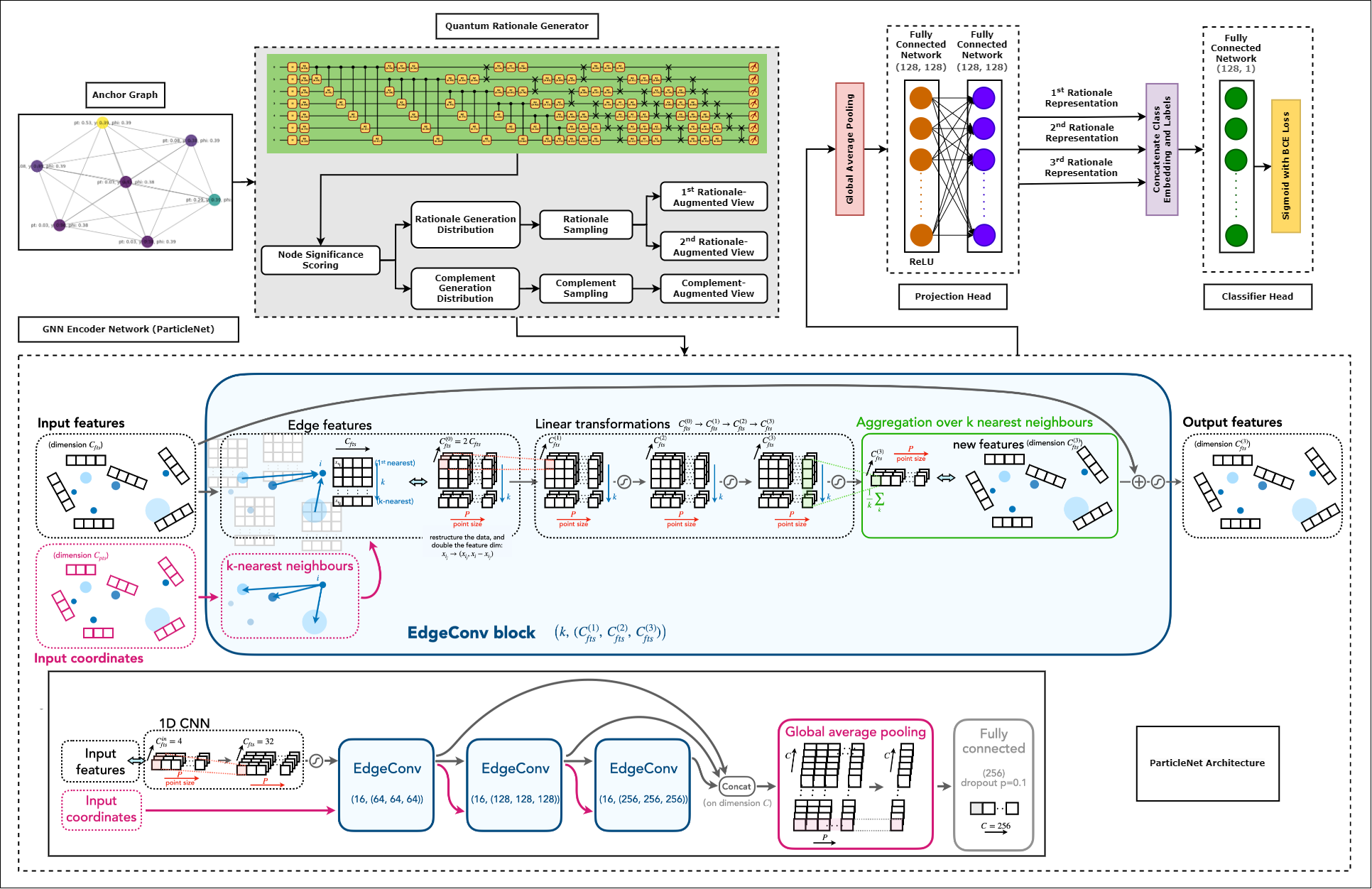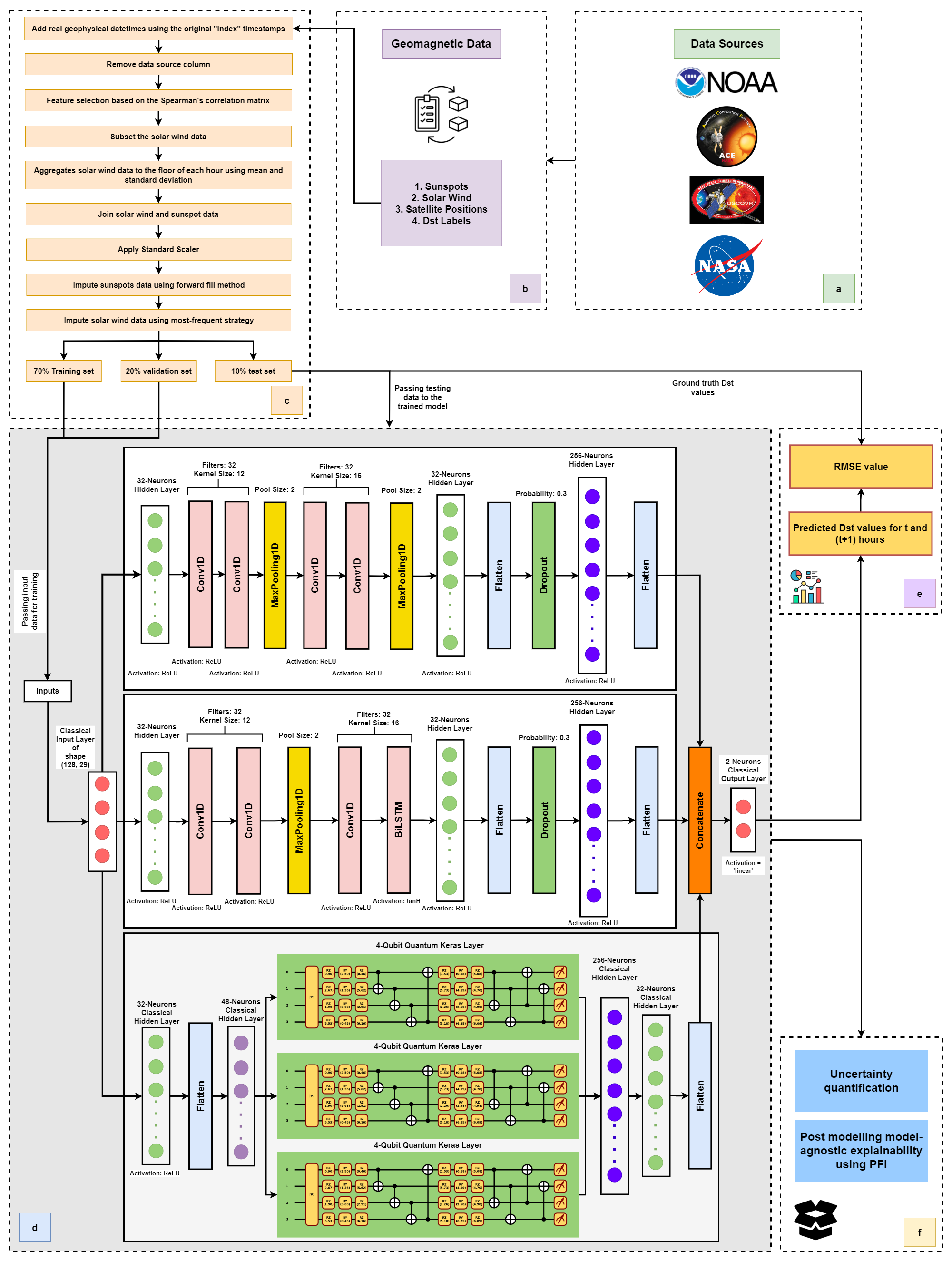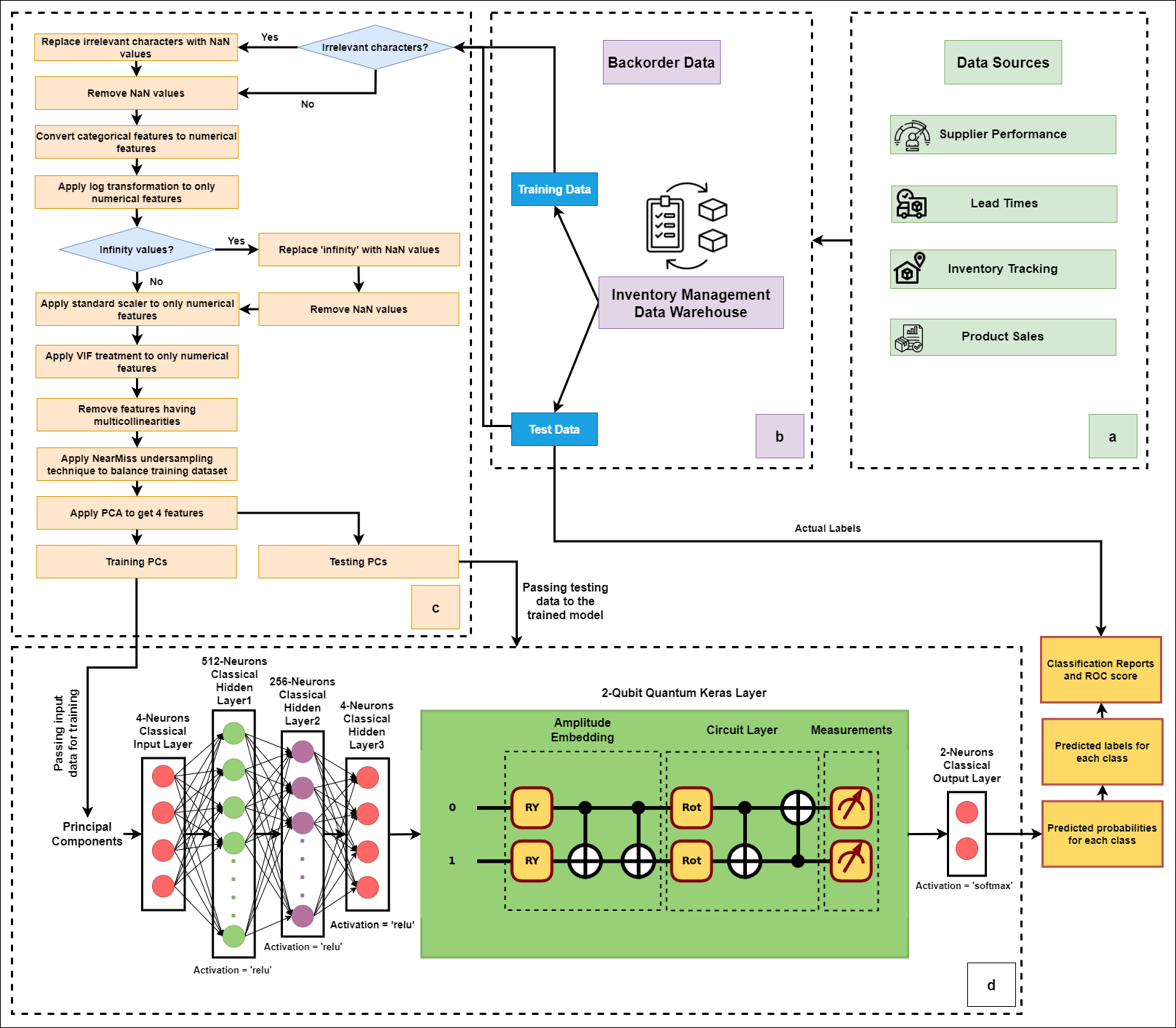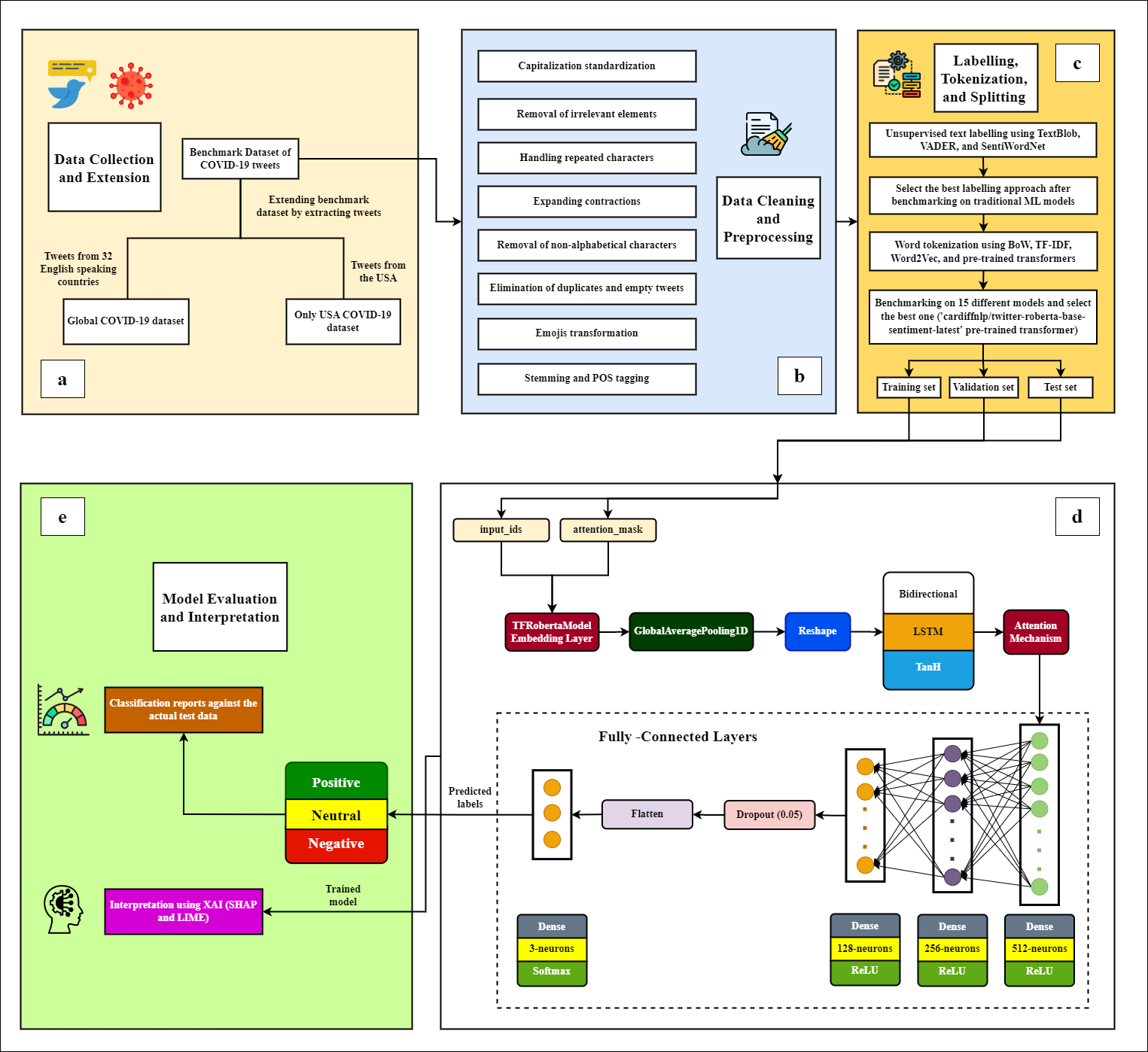Md Abrar Jahin
CS PhD Student & Graduate Fellow, USC Viterbi | AI Researcher, Center on Knowledge Graphs, USC ISI

Los Angeles, CA 90007, USA
Contact:
jahin[at]{usc, isi}.edu
This is Md Abrar Jahin, CSCA™; however, you can call me Abrar.
I am a CS PhD student at the Thomas Lord Department of Computer Science, Viterbi School of Engineering, University of Southern California (USC). I am affiliated with the Center on Knowledge Graphs at the Information Sciences Institute (ISI), located at the heart of Silicon Beach. I am fortunate to be co-advised by Prof. Craig Knoblock and Prof. Jay Pujara. My research at ISI is generously supported by the Defense Advanced Research Projects Agency (DARPA) and the US Air Force Research Laboratory (AFRL). I have also been awarded the prestigious Viterbi Graduate School Fellowship (2025-2026) in recognition of my outstanding academic promise.
Before joining USC, I obtained my B.Sc. in Industrial & Production Engineering (IPE) in March 2024 from the Department of Industrial Engineering and Management at Khulna University of Engineering and Technology (KUET).
My current research interests lie at the intersection of efficient deep learning, quantum machine learning, geometric deep learning, and trustworthy AI. My previous research includes reinforcement learning, sentiment analysis, operations research, and comparative genomics. I conceptualize and develop methods to solve complex problems either by hybridizing different techniques or by adopting ideas from seemingly unrelated fields to create novel, interdisciplinary solutions. My background in IPE and extensive research experience in comparative genomics help me approach challenging issues in machine learning from a uniquely interdisciplinary perspective. This distinctive lens allows me to conceptualize and implement efficient, unorthodox strategies beyond traditional machine learning frameworks.
Early Research Achievements
From my first year of university (2019), I started learning C/C++ and Python for problem-solving while maintaining strong academic performance. I participated in international competitions like IYMC (2019) and IAAC (2020), where I tackled challenging research-level problems. My first success on the international stage came from solving these problems using my own algorithms. This experience boosted my confidence and helped me realize my passion for research, leading me to pursue a career in AI. Since then, I haven’t looked back. I see learning as a lifelong journey. I deeply believe in the value of knowledge: its loyalty, its depth, and its power to endure over time.
I feel fortunate to have been the first Bangladeshi undergraduate student to receive the opportunity for two international research internships in the same year. After leading my team to win the “Smart Roads – Winter Road Maintenance Hackathon 2021”, I was offered a 3-week Machine Learning research internship at UiT - The Arctic University of Norway. During this internship, I contributed to the DIT4BEARs Smart Roads project.
I was honored to receive a fully-funded scholarship as the first Bangladeshi Research Intern (RI) (October 2021) at the Okinawa Institute of Science and Technology Graduate University (OIST). Under the supervision of Prof. Jonathan Miller (PhD in Biology, Cambridge; PhD in Physics, Caltech), I conducted research on perfectly conserved sequences in humans and other species in the Physics and Biology Unit (Miller Unit). Thanks to this early experience, I was fortunate to be offered another opportunity in 2023 as a Visiting Research Student (VRS) at OIST. After graduating in March 2024, I continued collaborating as a Visiting Researcher (VR) until March 2025, working closely with Prof. Miller as well as Dr. Zifcakova, Dr. Biller, Dr. Lajbner, and Dr. Pnini on the evolutionary dynamics of strongly conserved sequences in vertebrates and insects.
I had the privilege of being co-supervised by Prof. M. F. Mridha, Prof. Nilanjan Dey, Prof. Md. Saiful Islam, and Dr. Mohammad Arafat Hussain (Postdoctoral Fellow at Harvard Medical School) during my undergraduate studies and early research career. Additionally, I have had the opportunity to collaborate with distinguished computer scientists, including Prof. R. Simon Sherratt (IEEE Fellow), Prof. Jungpil Shin, Prof. Yuichi Okuyama, Prof. Zeyar Aung, Prof. Yutaka Watanobe, Prof. Md. Rashedul Islam, and Prof. Md. Jakir Hossen.
In Bangladesh, my undergraduate thesis was the first to focus on Quantum Machine Learning (QML) which ultimately led to a publication in Nature Scientific Reports. Some remarkable aspects of this achievement include:
- The first undergraduate thesis from KUET to be accepted by a Nature Portfolio journal, and notably, this occurred 5–6 months prior to graduation.
- The first publication from the KUET IEM department, by any student or faculty, in a Nature Portfolio journal.
- The first successful research on Quantum Computing to be published from KUET.
- The first application of Explainable Quantum Machine Learning in the domain of Supply Chain Management.
During the review phase of this paper in 2023, I was honored to receive an encouraging email from Professor Junyu Liu, a respected researcher in quantum information and ML and currently an Assistant Professor at the University of Pittsburgh. Professor Liu came across my thesis on arXiv while he was a postdoctoral researcher at the University of Chicago and kindly shared his appreciation for the work.
News
| Dec 10, 2025 | Thanks to Tithi Krittania for the unbelievable amount of time and patience she had allocated to take my interview; thanks to Md Arif Hasan, the founder of Beyond Stories and Short Stories, for the valuable offer to share my journey and short biography leading towards PhD acceptance at USC, in front of the nation. My deep appreciation goes to Shamsul Alam Rupon for this outstanding and thoughtful portrait editing, keeping my headshot in front of the famous Bovard Auditorium (USC). |
|---|---|
| Dec 5, 2025 | Thanks to NSU YES! (Young Entrepreneurs Society) [Official LinkedIn Post] for having me as a judge for Round 1 (Envision) of Entrepret Season 3, the flagship entrepreneurial challenge. It was especially meaningful to return in this role, as my own team ranked among the top 6 out of 380+ teams in Season 2 (2021). I thoroughly enjoyed evaluating ten outstanding business pitches, and selecting only the top two was both challenging and rewarding. |
| Sep 28, 2025 | KUET Research Society featured me and I had the privilege to spend a wonderful LA morning with 2.4K+ people. |
| Sep 25, 2025 | Our article “Predicting Male Domestic Violence Using Explainable Ensemble Learning and Exploratory Data Analysis” got accepted for publication in Discover Applied Sciences (Springer Nature) journal [Q2, I.F.=2.8]. |
| Sep 16, 2025 | I have been recognized with two Highly Commended Awards in the Computer Science category of The Global Undergraduate Awards 2025, placing both of my research papers among the top 10% globally. |
| Aug 29, 2025 | USC ISI featured me on their socials. |
| Aug 17, 2025 | Our article, “KACQ-DCNN: Uncertainty-Aware Interpretable Kolmogorov-Arnold Classical-Quantum Dual-Channel Neural Network for Heart Disease Detection,” has been accepted for publication in Computers in Biology and Medicine (Elsevier) [Impact Factor: 6.3, Q1 in both Scopus and WoS]. |
| Jul 10, 2025 | Our article “AdeptHEQ-FL: Adaptive Homomorphic Encryption for Federated Learning of Hybrid Classical-Quantum Models with Dynamic Layer Sparing” [Full Text] has been accepted for presentation in 1st ICCV BISCUIT Workshop 2025 (CORE Rank A*) which will be archived in the ICCV 2025 workshop proceedings. |
| Jun 10, 2025 | Our article “Vision Transformers for End-to-End Quark-Gluon Jet Classification from Calorimeter Images” [Full Text] has been accepted as poster in 3rd IJCAI GLOW Workshop 2025 (CORE Rank A*) which will be archived in the proceeding of Communications in Computer and Information Science (Springer Nature). |
| May 2, 2025 | Our “MCDFN: Supply Chain Demand Forecasting via an Explainable Multi-Channel Data Fusion Network Model” [Full Text] article has been accepted for publication in Evolutionary Intelligence (Springer Nature). |
| Apr 8, 2025 | My PhD SOP and PS have been approved and published on the cs-sop website, where you will get to know how I cracked the top schools considering the brutal funding conditions and in a competitive domain like CS-AI/ML Systems in Fall 2025, despite coming from a non-CS (IPE) background. |
| Mar 25, 2025 | Our article, “Ultrasound-Based AI for COVID-19 Detection: A Comprehensive Review of Public and Private Lung Ultrasound Datasets and Studies,” [Full Text] has been accepted for publication in Multimedia Tools and Applications (Springer Nature). |
| Mar 20, 2025 | Our article, “Lorentz-Equivariant Quantum Graph Neural Network for High-Energy Physics,” [Full Text] has been accepted for publication in IEEE Transactions on Artificial Intelligence (TAI). This marks the first Transactions article for our AMIR lab. My co-supervisors are extremely delighted with this remarkable achievement. |
| Feb 9, 2025 | USC CS Department informed me of my recommended admission to the PhD program and invited me to attend the PhD Visit Days on March 6–7, 2025, in Los Angeles. The two-day event includes meetings with faculty, current students, and department leadership, along with tours of the new Ginsburg Human-Centered Computation Hall and affiliated research centers such as ISI and ICT. |
| Feb 2, 2025 | Professor Craig Knoblock and Professor Jay Pujara jointly emailed me with the exciting news of my acceptance to the USC CS PhD program. They shared that I’ve been awarded a first-year fellowship, with guaranteed multi-year funding, and invited me to join their research group at the Center on Knowledge Graphs at ISI. |
| Nov 8, 2024 | Valeriy M., PhD, MBA, CQF (author of bestselling “Practical Guide to Applied Conformal-Prediction”) shared his optimistic views about our latest research article “Human-in-the-Loop Feature Selection Using Interpretable Kolmogorov-Arnold Network-based Double Deep Q-Network” (available as arXiv preprint).
|
| Oct 10, 2024 | Our 2 articles got accepted for publication in PLOS ONE and Nature Scientific Reports, respectively: [1] Shahriar*, H., Islam, M.S., Jahin*, M.A., Ridoy, I.A., Prottoy, R.R., Abid, A., Mridha, M.F. (2024). Exploring Internet of Things Adoption Challenges in Manufacturing Firms: A Fuzzy Analytical Hierarchy Process Approach. PLOS ONE. https://doi.org/10.48550/arXiv.2309.12350 [2] Jahin, M.A., Shovon, M.S.H., Mridha, M.F., Islam, M.R., Watanobe, Y. (2024). A Hybrid Transformer and Attention Based Recurrent Neural Network for Robust and Interpretable Sentiment Analysis of Tweets. Nature Scientific Reports. https://doi.org/10.48550/arXiv.2404.00297 |
| Jul 14, 2024 | Cierra Choucair (pursuing MS in CS @CU Boulder, USA) shared her optimistic insights on Twitter about our latest research article, ‘TriQXNet’ (not yet published), which is available as a preprint and featured this work on ‘The Daily Qubit’. [1] Labs, U. (2024, June 25). The Daily Qubit. The Daily Qubit. https://www.thedailyqubit.com/p/issue-97
|
| Jul 11, 2024 | Valeriy M., PhD, MBA, CQF (author of bestselling “Practical Guide to Applied Conformal-Prediction”) shared his opinion about our latest research article “TriQXNet: Forecasting Dst Index from Solar Wind Data Using an Interpretable Parallel Classical-Quantum Framework with Uncertainty Quantification” (available as arXiv preprint).
|
| Jul 10, 2024 | Our 2 research articles got published in Q1 journals (both Scopus and Web of Science indexed). [1] Saha, A. K.*, Jahin, M. A.*, Rafiquzzaman, Md., & Mridha, M. F. (2024). Ergonomic Design of Computer Laboratory Furniture: Mismatch Analysis Utilizing Anthropometric Data of University Students. Heliyon, e34063. https://doi.org/10.1016/j.heliyon.2024.e34063 [2] Ahmad, K.*, Islam, M. S., Jahin, M. A.*, & Mridha, M. F. (2024). Analysis of Internet of things implementation barriers in the cold supply chain: An integrated ISM-MICMAC and DEMATEL approach. PLOS ONE, 19(7), e0304118. https://doi.org/10.1371/journal.pone.0304118 |
| Jun 19, 2024 | Thanks to the organizers for selecting me anonymously as a reviewer for being among one of the top emerging young AI Researchers. It’s an honor for me as IEOM conferences are the topmost and the most prestigious in the field of “Industrial Engineering and Operations Management.” |
| Apr 24, 2024 | We’ve just hit the “submit” button for SpecX, our groundbreaking XAI-Powered Web App for Sentiment-Driven Disease Profiling & Specialist Allocation, in this year’s MIT Solve Challenge 2024 in the 2024 𝐺𝐿𝑂𝐵𝐴𝐿 𝐻𝐸𝐴𝐿𝑇𝐻 𝐸𝑄𝑈𝐼𝑇𝑌 𝐶𝐻𝐴𝐿𝐿𝐸𝑁𝐺𝐸 track. |
| Apr 16, 2024 | My research article, titled “𝐀 𝐍𝐚𝐭𝐮𝐫𝐚𝐥 𝐋𝐚𝐧𝐠𝐮𝐚𝐠𝐞 𝐏𝐫𝐨𝐜𝐞𝐬𝐬𝐢𝐧𝐠-𝐛𝐚𝐬𝐞𝐝 𝐂𝐥𝐚𝐬𝐬𝐢𝐟𝐢𝐜𝐚𝐭𝐢𝐨𝐧 𝐚𝐧𝐝 𝐌𝐨𝐝𝐞-𝐛𝐚𝐬𝐞𝐝 𝐑𝐚𝐧𝐤𝐢𝐧𝐠 𝐨𝐟 𝐌𝐮𝐬𝐜𝐮𝐥𝐨𝐬𝐤𝐞𝐥𝐞𝐭𝐚𝐥 𝐃𝐢𝐬𝐨𝐫𝐝𝐞𝐫 𝐑𝐢𝐬𝐤 𝐅𝐚𝐜𝐭𝐨𝐫𝐬,” has been published in the 𝑫𝒆𝒄𝒊𝒔𝒊𝒐𝒏 𝑨𝒏𝒂𝒍𝒚𝒕𝒊𝒄𝒔 𝑱𝒐𝒖𝒓𝒏𝒂𝒍 (Scopus Indexed, IF=2.143, Citescore=0.9)! |
| Feb 28, 2024 | Successfully arranged Research Counseling Program (Part-1), from KRS IEM Research Unit. The keynote speaker was Shawkat Shakil (PhD Candidate in ME, The University of Toledo, USA) from IEM’14, KUET. |
| Feb 28, 2024 | I successfully defended my B.Sc. undergrad thesis! Thesis Title: “Supply Chain Backorder Prediction Using Interpretable Hybrid Quantum-Classical Neural Network” published in Nature Scientific Reports). upervised By: Dr. Md. Saiful Islam, Associate Professor |
| Feb 8, 2024 | I developed the first-ever LaTeX template for B.Sc. Undergrad Thesis of KUET! Template |
| Feb 5, 2024 | Our research article, “𝐁𝐢𝐠 𝐃𝐚𝐭𝐚 – 𝐒𝐮𝐩𝐩𝐥𝐲 𝐂𝐡𝐚𝐢𝐧 𝐌𝐚𝐧𝐚𝐠𝐞𝐦𝐞𝐧𝐭 𝐅𝐫𝐚𝐦𝐞𝐰𝐨𝐫𝐤 𝐟𝐨𝐫 𝐅𝐨𝐫𝐞𝐜𝐚𝐬𝐭𝐢𝐧𝐠: 𝐃𝐚𝐭𝐚 𝐏𝐫𝐞𝐩𝐫𝐨𝐜𝐞𝐬𝐬𝐢𝐧𝐠 𝐚𝐧𝐝 𝐌𝐚𝐜𝐡𝐢𝐧𝐞 𝐋𝐞𝐚𝐫𝐧𝐢𝐧𝐠 𝐓𝐞𝐜𝐡𝐧𝐢𝐪𝐮𝐞𝐬,” got accepted for publication in 𝑨𝒓𝒄𝒉𝒊𝒗𝒆𝒔 𝒐𝒇 𝑪𝒐𝒎𝒑𝒖𝒕𝒂𝒕𝒊𝒐𝒏𝒂𝒍 𝑴𝒆𝒕𝒉𝒐𝒅𝒔 𝒊𝒏 𝑬𝒏𝒈𝒊𝒏𝒆𝒆𝒓𝒊𝒏𝒈 of Springer, a top-tier journal [I.F. = 9.7 (2022), Q1 ranking, Citescore = 14.1, SJR = 1.581, and H-index = 79]. It’s Q1 both in Scopus and WoS-based indexing. |
| Nov 2, 2023 | The ‘Team Aurora’ lead by me got Global Nomination in NASA Space Apps Challenge 2023! |
| Oct 19, 2023 | My undergrad thesis has been accepted to be published in Nature Scientific Reports, even 5-6 months before graduation. |
